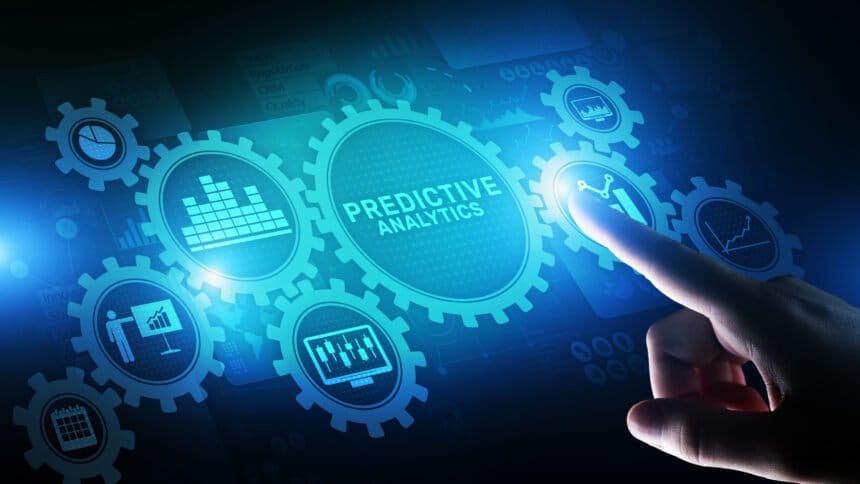Predictive analytics is having a huge impact on the world of business. As a result, global companies are projected to spend over $28.1 billion on it in 2026. One of its most valuable benefits is with forecasting.
- What is predictive analytics?
- How do predictive analytics and business intelligence work together?
- How can predictive analytics help in forecasting?
- Predicting customer churn
- Lead scoring
- Sales forecasting
- Learning about the larger market
- Optimizing resource allocation
- Faster, more sustained growth
- Innumerable benefits for your business
Forecasting is an essential part of any business’ growth. Thanks to advancements in predictive analytics, companies are being relieved of the slow, painstaking work that used to be involved in the forecasting process. Making sense of these new tools can be a challenge, of course, so it might be wise to employ the use of data analytics solution companies while you’re getting started. In this article, we will describe specific applications of forecasting for business growth and how they can benefit your business.
What is predictive analytics?
Predictive analytics is a branch of data science that uses historical data, along with machine learning operations to make predictions. Using sophisticated AI algorithms, predictive analytics identifies patterns in large amounts of data to make predictions about future events, market trends, demand fluctuations, and more. It can be used to analyze any aspect of a company’s operations or growth, and has numerous applications.
How do predictive analytics and business intelligence work together?
Business intelligence (BI) is defined as the tools and processes that are used to gather huge amounts of data and visualize it to facilitate business decision-making. BI involves creation of dashboards, reports, graphics, etc to make data easy enough for all stakeholders to interpret and apply for various tasks. The ultimate goal is to foster a data-driven approach on all levels and enable informed operational decisions.
Predictive analytics uses historical data and statistical algorithms to forecast future trends, while business intelligence leverages data analysis to provide insights for decision-making. Together, predictive analytics can enhance the capabilities of BI by providing forward-looking insights, enabling more informed and proactive strategic decisions within organizations.
Using business intelligence services can help companies make sense of it, and better understand how it is used in analytics.
How can predictive analytics help in forecasting?
As predictive analytics is by nature predictive, it naturally gives companies information about how their business landscape will look in the future. This has numerous manifestations for the businesses that use it.
Predicting customer churn
Predictive analytics can help save businesses a lot of time in determining what future customer churn levels will look like. People can make educated guesses about which customers are likely to remain loyal to them and which are more likely to drop off, but their means are limited.
Predictive analytics addresses these shortcomings by analyzing huge volumes of customer data, including feedback, levels of engagement, etc. In doing this, it is infinitely more accurate in predicting customer churn dynamics.
Lead scoring
Similarly, predictive analytics can analyze potential leads and create a more accurate “lead scoring” system. Marketing teams spend a lot of time trying to expand their customer bases, and predictive analytics can help them weed out unrealistic prospects so that they can focus on more likely ones. In this way, it saves marketing teams a great deal of time and effort, and also relieves uninterested customers from the burden of dealing with information that is not useful to them.
Sales forecasting
Predictive analytics gathers historical data, including an individual company’s, as well as relevant competitors’, and any other factors that might bear upon sales trends, and analyzes it to better forecast company sales.
Creating more accurate sales forecasts help businesses in numerous ways. They can be more efficient in budgeting because they know what will be called for. They can plan inventory more accurately. And they can delegate staff duties with a realistic idea of what they should do to reach target sales levels.
Learning about the larger market
Predictive analytics also helps to inform companies about large-scale trends taking place in the market. This helps individual companies understand not only their own growth better, but also what the demand will be for companies like theirs in the future, and what they can realistically expect from their products at different points in time.
Optimizing resource allocation
One of the problems that businesses often face is that they either overestimate the amount of resources that will be necessary to reach their sales goals – and consequently end up having allocated too much in the wrong place – or they underestimate and end up short.
In using predictive analytics, these concerns are largely addressed as the level of data analysis is far more detailed than that, which people could manage on their own. Companies can allocate exactly what they need because they have a more realistic idea of what their sales levels will be.
Faster, more sustained growth
Ultimately, the use of predictive analytics helps business leaders see the larger picture and what they need to do to get ahead and stay ahead. It is essential to look at the long term in terms of where the market is going, and also what this means for their business in particular.
For this reason, it is important that you not only use analytics in your planning, but continue using it as you evolve.
Innumerable benefits for your business
Using predictive analytics to help your business in its forecasting is a must in today’s business climate. Not only will the use of predictive analytics help you reach your business targets, it will also help you in every other aspect of your operations and planning.
Gaining a better understanding of your business’ realistic needs for the future will help you better manage your staff, allocate resources more effectively, and more accurately determine who your future customers will be. And your customer satisfaction rate will grow, as well, as you will do a better job of meeting their needs and doing so in a timely, personalized manner.








